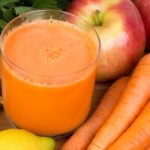
The theory of chemical imbalances helps us understand depression, but it doesn’t explain the underlying cause. Instead, scientists believe that it occurs due to a number of factors, including inflammation and chronic stress.
What’s more, a recent study suggests that depression and other mood disorders may originate in the gut.
Gut Bacteria: The Friendly And The Deadly
As we speak, there are roughly 400 species of bacteria in your belly right now, not to mention the ones that live on your skin (1).
The genes within these bacteria actually outnumber the ones in all the cells in your body: genomes of the bacteria and viruses of the human gut alone are thought to encode 3.3 million genes (2).
In fact, your gut acts as a protective layer to fight off harmful pathogens that have made their way into your digestive tract before they are absorbed into your bloodstream.
Gut bacteria are so important that they’re even in breast milk, and babies who are bottle-fed are more likely to suffer from allergies and immune problems because they’ve missed out on these essential critters.
Bacteria even plays a role in enhancing the effect of enzymes such as lactase, sucrase, maltase, alpha-glucosidase, and alkaline phosphatase, as well as metabolizing cholesterol and triglycerides to keep your blood pressure stable.
Don’t believe it, try this: modern medicine has adopted fecal transplants to reverse IBS, inflammatory bowel disease, and chronic infections. Current studies are exploring the other applications for this odd but effective intervention (3).
It’s no wonder that gut bacteria serve as a big part of your immune system and control the delicate balance between illness and health. What’s more, the bacteria in your gut also affect your brain.
Your Mood Explained
Researchers from Griffith University in Queensland, Australia, review the results of seven previous studies on over 300 volunteers to evaluate the positive effects of probiotic use on symptoms of depression, anxiety and perceived stress (4).
They wrote: “Interest in the gut-brain axis and emerging evidence that the intestinal microbiota can influence central nervous system function has led to the hypothesis that probiotic supplementation can have a positive effect on mood and psychological symptoms such as depression and anxiety.”
Although there were inconsistent results in some of the studies, the researchers concluded that “The meta-analysis showed that supplementation with probiotics resulted in a statistically significant improvement in psychological symptoms compared with placebo,”
Other Studies
This review was well warranted and shed light on the potentials of probiotic treatment, but it’s far from the only scientific voice out there (5).
Research published in Proceedings of the National Academy of Science showed that Lactobacillus rhamnosus, a bacterium found in yogurt, improved anxiety and depression in mouse studies. Researchers believe that this bacterium act on the gamma-aminobutyric acid (GABA) system to improve emotional behavior.
Moreover, neurobiologists at Oxford disease found that prebiotics anti-anxiety effect since they alter the way that people process emotional information.
“Prebiotics are dietary fibers (short chains of sugar molecules) that good bacteria break down, and use to multiply,” the study’s lead author, Oxford neurobiologist Dr. Philip Burnet, told The Huffington Post. “Prebiotics are ‘food’ for good bacteria already present in the gut. Taking prebiotics therefore increases the numbers of all species of good bacteria in the gut, which will theoretically have greater beneficial effects than [introducing] a single species.”(6)
In the study, 45 healthy adults between the ages of 18 and 45 took either a prebiotic or a placebo daily for 3 weeks. Their mental state was then evaluated through computer tests that processed emotional information.
The prebiotic group was much less sensitive to negative information and experienced less anxiety than the placebo group. Their results echoed those of participants in previous studies who were given antidepressants or anti-anxiety medication.
Plus, participants in the prebiotic group had lower levels of cortisol (a stress hormone linked to anxiety and depression), as measured through saliva testing.The study marked a new milestone, as it confirms the results of previous mice studies, but in humans (7).
“Time and time again, we hear from patients that they never felt depressed or anxious until they started experiencing problems with their gut,” Dr. Kirsten Tillisch, the study’s lead author, said in a statement. “Our study shows that the gut–brain connection is a two-way street.” (8)
According to Psychology Today, Ted Dinan, a professor of psychiatry at University College Cork explains that “there are three basic mechanisms underlying the astonishing connection between these lowly microorganisms and our very personalities: (1) Bacteria that live in the gut (or travel through it aboard some yogurt) are necessary building blocks in the production of neurochemicals there, like serotonin and dopamine. (2) That impact on neurochemicals in turn has an effect on the secretion of stress hormones like cortisol. (3) Gut bugs also play a vital role in regulating the immune system and the inflammatory response it can launch when things go haywire. Inflammation is now widely considered to be one underlying cause of depression.” (9)
Healthy Gut Healthy Mind
Mental health is complicated and can be influenced by a number of factors, including chronic stress, inflammation, and other underlying diseases.
Since nutrition is the foundation of your health, improving your diet can also benefit all the factors above.
To heal your gut, cut out processed foods, sugar, and alcohol from your diet as much as possible and make sure to eat plenty of dietary fiber from fresh foods, vegetables, grains, nuts, and legumes.
What’s more, stay hydrated, eat anti-inflammatory foods and spices, and make sure to eat your probiotics.
Great sources of probiotics and prebiotics include:
- Yogurt
- Sour cream
- Cottage cheese
- Kefir
- Kombucha
- Sauerkraut
- Kimchi
- Tempeh
- Natto
- Miso
- Lassi
- Sourdough bread

It’s also important to lower your stress levels, get plenty of sleep, exercise regularly, and replenish your gut bacteria after taking antibiotics.
With a little effort, and maybe a bit of emotional support, anxiety and depression can be successfully controlled.
source : dailyhealthpost.com



